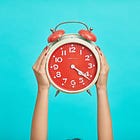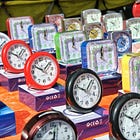Wibbly-Wobbly, Timey-Wimey Stuff
This might be the one time of year when we experience time as it is—rather than how we measure it.

My cats can tell time. Around 6:15 every evening, Bertie starts her insistent nuzzling, light biting, and ferocious purring routine. If I even so much as shift my weight on the sofa, she sees it as a sign that dinnertime is imminent.
Every morning at 10:45, Bertie and her sister Winnie make their way into my office and wait for me to head down to the kitchen. It's snack time.
For what it's worth, I've also discovered that Winnie has a litter box ritual that starts at 5 pm every day.
Now, I'm not trying to say my cats are special. I mean, of course, they are special. But not because they can tell time. I think anyone who has cared for a pet knows that animals have a great sense of time. Especially when it comes to anything related to digestion.
Keep reading or listen on the What Works podcast:
A 2018 study by Daniel Dombeck at Northwestern University actually put this folk knowledge to the test. He and his team studied mice behavior during a timed task. They also did brain imaging to figure out what brain cells fired while the mice waited for the correct time to elapse. Not only did the mice perform the task using the right timing, but the neuroscientists could track how the wait time impacted the brains of the mice.
The mice, it turned out, could tell time, too.
When we think about time, we tend to think about clocks and calendars.
But clocks and calendars aren't time. They don't produce time. They're not even precise measures of time. Time is a relative, embodied experience. That's why Dombeck's mice and my cats can "tell time" even though they can't make heads or tails of a calendar or clock.
On a calendar, each day is the same shape—a box exactly the same size as the ones beside it. One day is the same as any other day. On a clock, each hour is equidistant from the hours on either side of it. One hour is the same as the next.
We regulate our lives and especially our work with technologies that turn the passage of time into equal quantities. On the calendar, we all live the same Monday. And that Monday is the same as any other Monday. On the clock, we all live the same noon. And that noon is the same as any other noon.
We measure productivity as the productive output achieved during a certain period of time. Being more productive is achieving the same amount of output in less time. It's simple enough math, as long as we're willing to treat labor hours and tasks as interchangeable. "Or to take another example," writes ecological economist Tim Jackson, "what is to be gained by asking the New York Philharmonic to play Beethoven’s 9th Symphony faster and faster each year?"
As theorist Barbara Adam points out, we exist in time with two different sets of assumptions. One set of assumptions regulates our economic activity. One set of assumptions shapes our experience and quality of life. One set of assumptions turns clocks and calendars into infallible technologies. The other set of assumptions notices that the days get shorter as the air grows colder.
To underscore just how different these sets of assumptions are, she points out that "while tempo and timing are crucial and contextually unique in living processes, the tempo and timing of clock-time are pre-set by the designer." Any variation in the timing and tempo of a clock, she notes, would be a sign of a broken clock.
I'll add that our hearts beat at a wide range of tempos throughout the day. At rest, they might beat once per second. In a lively meeting, they might beat 80 or 90 times per minute. In the middle of a 5k race, my heart will beat at more than twice that rate.
Economic activity, broadly defined, relies on the perception of time we learn from clocks and calendars. Sameness and equal measure.
But our life activity exists within a malleable and visceral experience of time. Time changes based on what I'm doing, how I'm feeling, who I'm with, and what my senses tell me. Winter time is different from summer time. New baby time is different from visiting colleges time.
I know that an hour spent writing at 6 am is different than an hour spent writing at 11 pm. In the morning, my thoughts flow easily. At night, my brain feels sluggish, and my words don't fit together. Others, of course, have the exact opposite experience.
My experience of time is unique. Each hour, each day, each year is unique. My noon is different from your noon. My noon today is different from my noon a week from now. Our intuitive and embodied sense of time accepts this uniqueness.
But the clock and the calendar don't.
This is an especially timey-wimey season.
Unless you're working in retail or hospitality (in which case, please take care of yourself), there's a good chance that productivity just isn't as important as it normally is. The days are a little chattier, the hours a little more relaxed. Maybe the "out of office" reply is already up, and Zoom is blessedly shut down until the new year.
This is a liminal period where the experience of time shifts toward the intuitive and embodied and away from the economic. Maybe we're still rushing around—but it's because we're trying to fit in more hugs, more laughs, and more memories.
So if I can offer one more provocation concerning work before the year is out, it is this: I believe we do more meaningful, more satisfying, and more valuable work when we let the work process be timey-wimey. Innovation, creativity, and analysis know about as much as my cats when it comes to calendars and clocks. Collaboration and care are even less concerned with the regulation of economic activity.
Throughout the knowledge, service, and care sectors, the skills we prize most require our experience rather than our productivity. Our attention rather than our measurement.
What would it take to make the kind of time we experience in the last few days of the year the kind of time we experience all year round? How would we work differently we gave less attention to the calendar or the clock and more attention to our senses?
I'm not naïve. Calendars and clocks are important and useful tools. But I think we'd be much better off if we remember that clocks and calendars can't dictate our experience of time unless we let them.
I want to leave you with a few lines from Ted Chiang's short story "The Lifecycle of Software Objects." He writes:
"...if you want to create the common sense that comes from twenty years of being in the world, you need to devote twenty years to the task. You can’t assemble an equivalent collection of heuristics in less time; experience is algorithmically incompressible."








